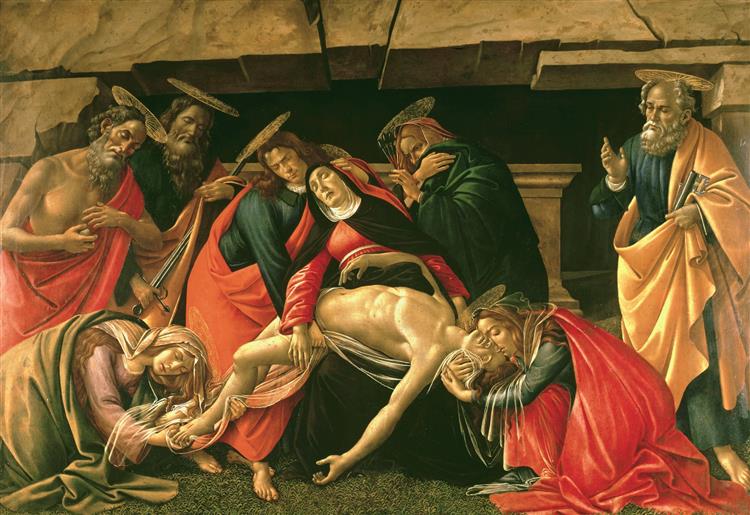Opis
The painting "Lamentation over the Dead Christ with Saints Girolamo - Pietro and Paolo" by Sandro Botticelli, created in 1492, is a work that encapsulates a deep emotional and spiritual charge, typical of the Italian Renaissance. Botticelli, known for his skill in the representation of the human figure and the use of vibrant colors, displays in this work a moving scene in which sadness, devotion and transcendence are combined.
The composition of the work is remarkably balanced. At the centre of the painting is the lifeless body of Christ, supported by several figures expressing deep sorrow. Their horizontal position and use of chiaroscuro help to focus attention on the centrality of his sacrifice. Around him, Saints Jerome and Paul, depicted in specific attire, lend a sense of veneration and authority to the scene. Their proximity to Christ's body suggests an intimate link between the human and the divine, giving additional meaning to the Lamentation.
The colour, characteristic of Botticelli, is rich and nuanced. The palette used combines soft tones with more vivid accents, enhancing the expressiveness of the figures. The pale skin tones contrast with the more intensely coloured clothing, creating a sense of closeness and distance between the characters and the viewer. This technique of using colour contributes to the creation of specific atmospheres, and in this work manages to convey a feeling of deep, almost palpable sorrow.
From a technical point of view, attention to detail is one of Botticelli's hallmarks. The facial expressions of the figures are carefully crafted, reflecting sadness, wonder and anguish at Christ's death. Furthermore, the use of soft lines and well-defined contours reinforces the elegance of the figures, a characteristic that Botticelli often employs in his work. The arrangement of the figures in the composition creates a visual line that guides the viewer's gaze towards the central axis of the painting: the body of Christ.
This work can also be interpreted within the broader context of Botticelli's works on religious themes. The Lamentation is set at a specific moment in his career, marked by an evolution of his style and a search for greater emotional drama. The depiction of the death of Christ is a recurring theme in Renaissance art, but Botticelli offers an interpretation that is distinguished by its emphasis on emotional charge and sublime use of color and form.
In light of the history surrounding this work, it is essential to note its temporal circumstance, being produced in 1492, a year that also marked a significant change in the history of Italy and Europe. This turbulent context can be reflected in Botticelli's visual language, which mixes Christian devotion with a palpable, suffering humanity. The duality between death and hope in the rebirth of the Spirit is a tension that is present in many of his works.
In conclusion, "Lamentation over the Dead Christ with Saints Girolamo, Pietro and Paolo" is a work that not only demonstrates Sandro Botticelli's technical mastery, but also invites a deep reflection on death, sadness and spirituality. This canvas, marked by its compositional elegance and chromatic intensity, stands as a testimony to the art of the Renaissance, a moment in history that sought a more intimate connection between the human and the divine. Thus, the work not only stands as an object of aesthetic admiration, but becomes a means to explore human emotions in their purest form and the fundamental role of sacrifice in Christian narrative.
KUADROS ©, a famous painting on your wall.
Hand-made oil painting reproductions, with the quality of professional artists and the distinctive seal of KUADROS ©.
Painting reproduction service with satisfaction guarantee. If you are not completely satisfied with the replica of your painting, we will refund 100% of your money.

